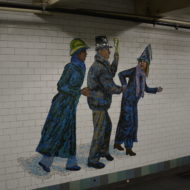I know, right?! If only there were a huge project that involved every government on Earth and all the people who know what they’re talking about (i.e. scientists) and every 5 years produced a 3 volume, 3000 page, 30,000 footnote report that scrupulously documented the current state of human knowledge about the human dimensions of climate change!
Fifth Assessment Report – Synthesis Report
Good news! Start with the synthesis report.
If you want a three-sentence summary of the situation:
- Ignore deniers.
- The longer we pump out GHGs, the more we raise the floor on future temperatures and the more we acidify the oceans.
- All the things that we should do anyway (TTWSDA) to improve food, water, health, economic security, energy efficiency, etc. will help us limit and mitigate the anthropogenic component of climate change.
Fact: CO2 in the atmosphere has increased from about 250 ppm to 400 ppm in the last 150 years.
Fact: CO2 blocks infra-red (heat) radiation from the earth to space.
Fact: Ocean levels are rising. Mostly from the ocean warming up for now, but also from melting glaciers.
Fact: Oceans are getting more acidic. Shellfish in places no longer can make shells. Corals are dying.
Fact: It’s getting warmer. This one is often disputed. We are measuring very small differences, and so a lot of thought has to go into how you use the data. (E.g. A weather station that used to be in the country is now surrounded by city, so it reads warmer. A weather station uses a different kind of paint on it’s weather hutch, and the average temperature falls by .02 degrees.)
Fact: Mountain glaciers are smaller than they were 50 years ago.
Fact: Greenland is melting.
Fact: Mountain glaciers are smaller than they were 50 years ago.
Fact: Greenland is melting.
Fact: Parts of Antarctica west shelf are melting at rates up to 60 feet a year.
Fact: The USDA has produced new climate zone maps (plant hardiness maps) in 1990 and in 2012. In both case zones moved north.
Models: The mechanisms that heat moves through the atmosphere are complex. Different models give different results in detail, but give the same general overview: It’s getting warmer. It’s going to continue to get warmer.
Part 2.
Are we doing all we can?
Not hardly. We are barely doing anything at all.
We should be:
- Taxing carbon at the point it comes out of the ground. Start at $100/ton and increase it at $50/t/year. $50/ton increases theprice of gas by about 35 cents/gallon (8 c/liter) or about 10%. This is small enough that present car owners can live with it for the remaining life of their vehicles. But in 10 years it doubles the price of gasoline.
- Rezoning our cities allowing light industry, retail, and professional businesses to occupy residential areas so that a much larger fraction of people can live within walking distance of work.
- Pushing the development of biochar hard. This looks like the simplest way to sequester carbon. Many ag areas have tons of waste per acre to deal with.
- Implementing time of day pricing of electricity at the retail level.
- Redo building codes to require buildings to be far more energy efficient. Researching how to best re-insulate existing buildings.
- Require cities to set aside space for mass transit systems as they expand.
- Encourage telecommuting, both for the worker and for employers.
Start with this website: Climate Etc. It is written by Dr. Judith Curry, Professor and former Chair of the gatech.edu School of Earth and Atmospheric Sciencesat the Georgia Institute of Technology. It is balanced and very thorough in its coverage of the issues. Beware, though, it will take many, many hours to even begin to explore the complexities reflected on her blog.

